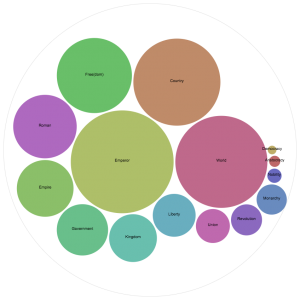A Textual Analysis Graph of the Words Associated with Governmental Forms and Values Present in the Top 50 Books Borrowed from the New York Society Library
To view the data in this graph more closely, click on the image and then zoom in
Until now, this project has explored many aspects of the New York Society Library’s texts, their authors, and the reading habits of the Founding Fathers who went there. Although previous research on the library’s ledgers has examined the possible effects of characteristics like author, gender, and book popularity on the beliefs of these revolutionary men, it has not yet been able to dive into how the values portrayed in the New York Society Library’s books could have influenced these beliefs as well. As the renowned creators of democracy as it is known today, it is assuredly hard to believe that the Founding Fathers came to these ideas without outside inspiration. A look at some of the books in the New York Society Library’s ledgers leads researchers to inquire whether or not America’s government may have been shaped by any democratic values espoused in the ledgers most commonly-borrowed books.
To begin an examination of whether the top 50 texts in the New York Society Library ledgers were representative of the Founding Father’s interests in democracy, the data for this textual analysis visualization was first narrowed down from that of the full corpus of library texts to that of the top 50 most popular books, magazines, and other works in its collection. Only 14 works (of these top 50 pieces of literature) were digitally available in their entirety. By uploading the compiled text of these 14 works into the textual analysis program Voyant Tools, the New York Society Library’s corpus of books could be specifically searched for vocabulary pertaining to democracy and other forms of government; the tallied counts of such identified keywords (democratic, freedom, and liberty, as well as monarchy, empire, and kingdom, among others) were then inserted into the online program RAW graphs to produce the above graphic, where the largest circles represent the words most popularly used in these 14 works. The results are striking: not only was democracy mentioned the least in the text evaluated, the books most often borrowed from the library appear to mention contrasting forms of government with surprising prevalence.
The most frequently-used word among the texts borrowed by the Founding Fathers was “emperor,” followed by “world,” and then “country.” The use of “emperor” in the books the Founding Fathers read is consistent with many of the books they borrowed, such as The History of the Decline and Fall of the Roman Empire, one of the most widely borrowed texts. The regularity of Greek and Roman historical accounts found in the ledgers also corresponds with the words of scholar Wilson Ober Clough, who argues that though these men were fond of Greek and Latin heroes, they considered emperors and tyrants “their abhorrence” (Clough 21). The term “emperor” suggests the significant influence of the Roman Empire and imperial examples on the way in which the Founding Fathers perceived politics and government. The linguistic background of these American forefathers might have additionally been responsible for their communal interest in the history of Rome, other empires and countries, and the world in general, as many of them were trained in Latin, Greek, French and other academically-useful languages (Allaire 3). As other research on the New York Society Library ledgers has already shown, the Founding Fathers were not ignorant of global history, philosophy, and literature in the process of building the United States’ government.
The next two most popular words found in the 14 works evaluated, “country” and “world,” imply a shifting paradigm in perceptions of the world during the Founding Fathers’ time. The reading of books that repeatedly referenced the world and other countries suggests that these men may have wanted to compare their new Constitution to governments around the globe. These keywords suggest that the Founding Fathers’ beliefs were transitioning to what eventually became and what is currently regarded a globalized world. These men, though patriotic, did not necessarily limit themselves to the interests of their region or their local community; they desired to be informed about different cultures and histories, as indicated by their vested commitments to studying Ancient Rome, foreign philosophy, and foreign languages (Allaire). William Few, for instance, borrowed Montesquieu’s The Spirit of the Law and other texts in French (translated as “De l’esprit des Lois”), and he was not the only one to do so. Less widespread keywords within the texts, such as “revolution”, “liberty”, and “union”, were still persistently included with words like “emperor”, “world” and “country” in the writings of Voltaire and Montesquieu, as well as in the sentimentalist writings of Charlotte Turner Smith and Fanny Burney (who are included among the top 50 texts). These keywords may derive purely from 14 of the countless books at the New York Society Library (and their authors may not have understood or lived in the same political climate and context as the Founding Fathers), yet the ideas to which they connect remain exemplative of the political theories being read and discussed during the Revolutionary era.
While keywords not associated with democracy appear more often in this visualization, their frequent inclusion is not meant to take away from any other government ideas and political values that could have inspired the Founding Fathers. The conclusions of the above graphic and this analysis are not the final answer as to whether America’s democracy was inspired by texts at the New York Society Library. Many of the library’s visitors continually seemed to share this desire to better understand the intricacies of their age’s global and political landscape (Elkins). Their commitment to education about government and diverse interests prove to be just another testament to the Founding Fathers’ tenacity and curiosity, observed throughout their reading habits.
